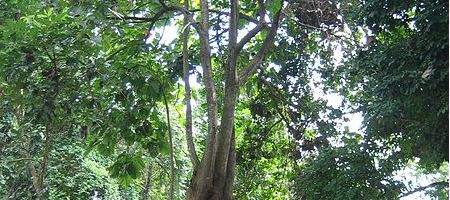Tiny microbes and a tropical tree can be used to lock up carbon dioxide – and turn it into an agricultural soil improver.

Scientists have discovered that when the Iroko tree is grown in dry, acidic soil and treated with a combination of natural fungus and bacteria, it produces a mineral in the soil around its roots.
It does this by combining calcium from the earth with CO2 from the atmosphere. The bacteria then create the conditions under which the resulting mineral turns into limestone.
The process locks carbon into the soil, keeping it out of the atmosphere, with the mineral in the soil having the happy side effect of making it more suitable for agriculture.
“By taking advantage of this natural limestone-producing process, we have a low-tech, safe, readily-employed and easily maintained way to lock carbon out of the atmosphere, while enriching farming conditions in tropical countries,” says Dr Bryne Ngwenya of the University of Edinburgh’s School of GeoSciences.
The team believes the discovery could lead to reforestation projects in tropical countries, and help reduce carbon dioxide emissions in the developing world. The technique has already been used successfully in West Africa, and is also being tested in Bolivia, Haiti and India.
The project examined several microbiological methods for locking up CO2 as limestone, and the Iroko-bacteria pathway showed best results.






